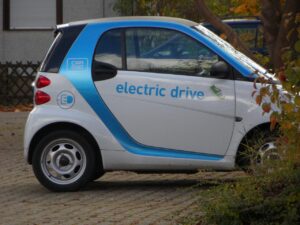
Home / EV Charging News / Can a Weak Battery Impact EV Performance?
As electric vehicles (EVs) become more prevalent on the roads, understanding the impact of battery health on performance is crucial. The battery is the heart of an EV, powering everything from acceleration to range. But what happens when the battery weakens over time? This article explores how a weak battery can affect various aspects of EV performance and what steps can be taken to mitigate these effects.
A weak battery in an EV is typically characterized by a reduced ability to hold a charge, longer charging times, and a noticeable drop in driving range. Several factors contribute to battery degradation, including age, usage patterns, and exposure to extreme temperatures. Over time, these factors cause the battery cells to deteriorate, impacting their capacity and efficiency. Indicators of a weakening battery include reduced driving range, increased frequency of charging, and potentially longer charging durations.
A weak battery can significantly influence the driving range and efficiency of an EV. One of the most immediate effects is a reduction in the overall driving range. As the battery loses capacity, the distance an EV can travel on a single charge diminishes, requiring more frequent recharging stops. This reduction in range can be particularly problematic for long-distance travel and can lead to increased range anxiety among drivers. Additionally, a weak battery can affect the energy efficiency of the vehicle, as the system may need to work harder to deliver the required power, further reducing the effective range per charge.
The power delivery and acceleration capabilities of an EV are also affected by battery health. A weak battery may struggle to provide the necessary power for rapid acceleration, resulting in slower response times and decreased overall performance. This can be particularly noticeable when attempting to accelerate quickly from a stop or when merging onto highways. The reduced power output can affect the driving experience, making the vehicle feel less responsive and less capable of handling demanding driving conditions.
Battery degradation can also impact charging speed and efficiency. As the battery’s capacity decreases, it may take longer to reach a full charge. This extended charging time can be inconvenient for drivers who rely on quick turnaround times, especially during long trips. Additionally, a weak battery may not be able to handle fast charging as effectively, leading to slower charging rates even at high-powered charging stations. This inefficiency can further exacerbate range anxiety, as drivers may find themselves spending more time at charging stations than anticipated.
The reliability of a weakened battery can also contribute to increased range anxiety. When the battery’s performance becomes unpredictable, drivers may find it challenging to plan long trips with confidence. The fear of running out of power before reaching a charging station can limit the practicality of using an EV for extended travel. This uncertainty can be a significant deterrent for potential EV buyers who prioritize reliability and ease of use.
The lifespan of an EV battery is directly impacted by its health. A weak battery will not only reduce the vehicle’s performance but also shorten its overall lifespan. Regular maintenance and monitoring are essential to extend the life of the battery and ensure consistent performance. This involves routine checks and maintenance practices to detect early signs of battery issues, such as decreased capacity or increased charging times. Implementing preventative measures can help mitigate the effects of battery degradation and maintain optimal performance.
Financial considerations also come into play when dealing with a weak battery. Replacing or repairing a degraded battery can be costly, and it’s important for EV owners to understand the potential financial implications. Many manufacturers offer warranties and coverage for battery issues, but understanding the terms and conditions of these warranties is crucial. Ensuring compliance with recommended charging and maintenance practices can help preserve the battery’s health and potentially avoid costly repairs or replacements.
Advanced battery management systems (BMS) play a crucial role in monitoring and maintaining battery health. These systems continuously monitor the state of charge, voltage, temperature, and overall health of the battery cells. By regulating charging and discharging cycles, BMS helps mitigate the adverse effects of battery degradation. Modern BMS technology can adjust the charging rate and balance the load across the battery cells, optimizing performance and extending battery life.
Thermal management is another critical aspect of preserving battery health. Effective thermal management systems control the temperature of the battery during charging and discharging cycles, preventing overheating and ensuring optimal performance. By maintaining the battery within a safe temperature range, these systems reduce the risk of heat-induced degradation, which is a common issue with high-capacity lithium-ion batteries used in EVs.
Adopting optimal charging practices is essential for maintaining battery health. This includes avoiding extreme states of charge (SOC), such as consistently charging to 100% or discharging to 0%. Instead, maintaining a moderate SOC, typically between 20% and 80%, can help extend the battery’s lifespan. Additionally, avoiding exposure to extreme temperatures, both hot and cold, can prevent accelerated degradation of the battery cells.
Regular maintenance and monitoring are key to detecting early signs of battery issues and addressing them promptly. Utilizing tools and technologies for battery health monitoring can provide valuable insights into the battery’s condition and performance. Routine inspections and maintenance can identify potential problems before they become significant, ensuring that the battery remains in good health and performs reliably over time.
A weak battery can significantly impact the performance of an EV, affecting everything from driving range and efficiency to acceleration and charging speed. Understanding the factors that contribute to battery degradation and adopting preventative measures can help mitigate these effects. By leveraging advanced battery management systems and thermal management technologies, EV owners can maintain optimal battery health and extend the lifespan of their vehicles. Regular maintenance and adherence to recommended charging practices are essential for ensuring consistent performance and avoiding costly repairs. As EV technology continues to evolve, understanding and managing battery health will remain a critical aspect of owning and operating electric vehicles.



